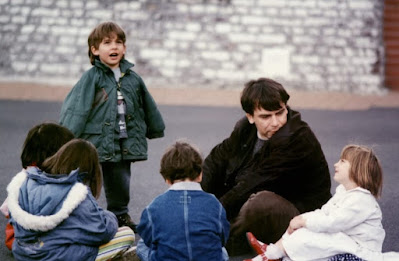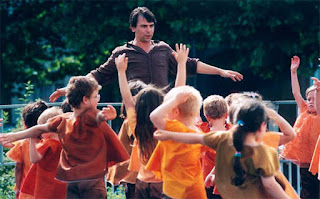"For its commitment to everyday heroism, its multi-layered approach to an array of social problems, and for the visual force of the storytelling.”--Citation of the FIPRESCI award bestowed on the film It All Starts Today at the Berlin International Film Festival
There have been
several films made on uplifting student-teacher relationships. These include To
Sir, With Love (1967) a film on boisterous white high school students from
slums of London eventually admiring and respecting their black rookie teacher; Dead Poet’s Society (1989) on another
rookie teacher kindling creative self-expression through poetry in a US boarding school for senior US students
from wealthy backgrounds resulting in
their unwavering respect and love for him; Goodbye, Mr Chips (1969), a
remake of a film made 30 years before, where a stodgy Latin teacher after his marriage
transforms himself into an endearing school
headmaster winning the hearts of his students; Not One Less (1999), a neorealist
Chinese film with real life characters playing their real roles directed by
Yimou Zhang, focusing on a real life 13-year-old substitute teacher bringing to
the fore the urban-rural education divide and the earnest desire of the teacher
to teach and care for all her wards equally well; and The
Class (2008), a French film on the true experiences of a French language
and literature middle-school teacher dealing with his foreign-born students disciplining
them and gradually gaining their confidence--yet, not all students feel they ‘learned’
anything in his class.
It is Bertrand
Tavernier’s two feature films on related subjects that discuss matters more
substantive in the teacher-pupil interactivity, namely his films A Week’s Vacation (1980) and It All Starts
Today (1999). In both films, the teachers are not rookies they have some credible experience in their jobs. The former discusses the
importance of a female teacher observing and "listening" to her
pupils in their early teens in a school in Lyons, France. The film underscores
the fact that a reflective teacher could gain from the interactions with the
pupils. However, Tavernier’s It All
Starts Today inverts the teaching role further to a teacher taking
proactive steps to get the local government and the student’s parents to get
involved in helping the teachers to impart education as they wish they could
with limited resources provided by the local government.
 |
| Daniel (Philippe Torreton) truly cares for his students and they love him for it |
It All Starts Today has actor Philippe Torreton playing the role of Daniel, a head teacher of
a primary school in a small mining town in France where former miners Daniel’s
father survive with an oxygen cylinder strapped to his back. Miners not only
battle pollution of particulate matter affecting tem while they worked in the mines, they have few
other options of re-employment. Some are not clever enough to look for sustainable options for livelihood and slip into despair. Most are not sufficiently educated to move out and
nor do they have any plans to start a new life and hence spend their days and
nights in front of the TV sets. Their offspring are named after characters like
“Starsky” and “Hutch” from popular US TV
serials. Some of the families cannot pay their utility bills and send their
kids where they can get some education and mingle with others of their age.
Worse still it is these cash-strapped families who are expected to support Daniel’s
school through funds provided by the local civil council.
Daniel is the angry
young man who is livid when the council cuts the lunch program for the kids and
the parents are supposed to provide each kid with their lunches. When Daniel confronts the
chief of the civic body, he is told the council has no money and Daniel, the
underpaid teacher, offers a small contribution from his purse so that they make
efforts to garner more funds to restart the scheme.
 |
| Daniel takes food on a personal initiative to the home of a child whose parents are struggling to survive; the other kids on the street are only marginally better off |
Tavernier and his co-scriptwriters
keep the viewer cleverly engaged to the bleak tale of the film using two tools. The first is Daniel’s
demanding parallel personal life where his father is sick and his girlfriend wants him
to father her next child while he pleases every student (including his girlfriend's son from an earlier relationship with another man) with care and empathy. The second is Daniel's and his girlfriend’s out-of-the-box ideas to keep the young students
happy and educated. One such innovative idea is to ask a parent, who is a truck
driver, to bring his heavy duty truck to the school for the students to see what
it could do—which proves to be a real treat for the kids who have never seen
such a huge vehicle up-close.
 |
| Daniel, the angry multi-tasking primary school teacher, is not just good at his job, he is loved by his students |
When a financially struggling
parent commits suicide with the children, the community that had preferred to
look the other way comes out in full strength providing a flower-decked
hearse. Tavernier’s strength has been
his choice of credible actors in minor roles such as the lady—Mrs Henry--who is
driven to suicide because she does not see any hope to improve her lot.
 |
| Daniel talks to a child to figure out if he is being ill-treated at home, a role uncommon in a usual teacher-student relationship |
Daniel is concerned
and takes proactive steps to stop a student from being brutalized at home by an abusive step-parent. The film is not merely a tale of an angry teacher forced to multi-task; it is a film about an
individual being proactive to make the economically depressed society of a mining
town to realize that change in their attitudes will go a long way to help their
progenies to prepare for the future. The FIPRESCI award citation for the film (mentioned
above) captured the strengths of the film well.
P.S. It All Starts Today won the FIPRESCI prize at the Berlin international film festival in 1999 and was nominated for the Golden Bear. It won the Prize of the Ecumenical Jury and an Honorable Mention from the main Competition Jury for “the specialty of the topic;” the Best Film awards at the ASECAN, Sant Jordi and the Fotogramas de Plata film festivals, all three in Spain; the Audience Award at the San Sebastian International Film Festival, Spain; the Best Actor award at the Lumiere Awards, France; and the Ecumenical Film Award at the Norwegian Film Festival. The other 1999 film mentioned above Not One Less, made in China, was reviewed earlier on this blog. (Please click on that name in this post-script to access the review)

No comments :
Post a Comment